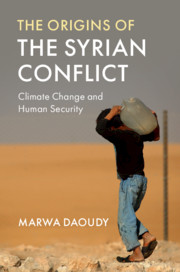5 - Vulnerability and Resilience
Human–Environmental–Climate Security in Syria
from II - Human–Environmental–Climate Security (HECS)
Published online by Cambridge University Press: 05 March 2020
Summary
Chapter 5 evaluates the claim that climate change caused the Syrian conflict and concludes that ultimately political factors were more important than a climate-induced drought in the buildup to the uprising. While some international scholars attribute the Syrian uprising to a climate-induced drought, the chapter finds that domestic sources point to a different conclusion: Political context was more significant than water scarcity from drought in worsening the human security of the vulnerable populations of Syria, paving the way for the Syrian uprising. This conclusion is based on an analysis of the sources of Syria’s environmental, economic, and social vulnerabilities following the 2006–2010 drought and an earlier 1998–2001 drought, which reveals a vulnerability nexus in the northeast of Syria. The region was experiencing high levels of poverty and unemployment, high dependence on the agricultural sector and water scarcity, and poor soil quality from unsustainable practices. Together with increased corruption, these factors made the region disproportionately vulnerable to the impact of drought. Ultimately, the government’s poor water and agricultural policies pushed a weather event into a crisis, which could have been avoided or mitigated with sound policies.
Keywords
Information
- Type
- Chapter
- Information
- The Origins of the Syrian ConflictClimate Change and Human Security, pp. 150 - 204Publisher: Cambridge University PressPrint publication year: 2020
